We use cookies to ensure that we give you the best experience on our website. If you continue to use this site we will assume that you are happy with it
How To Find Out Where Someone Works (Legally In 2023)
 Written by Background Check Repair
Written by Background Check Repair
Background Checks | June 7, 2024
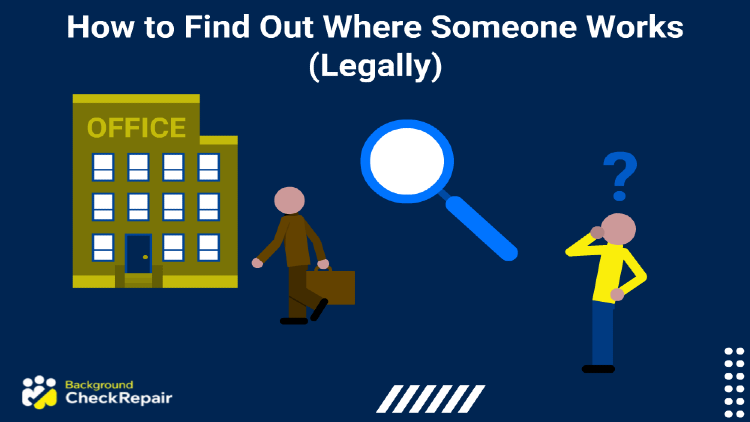
Table of Contents
Figuring out how to find out where someone works can come in handy if you are trying to reach them for legal or personal reasons. Sometimes a search is done for personal satisfaction, while other times it is done to track down an individual regarding an outstanding debt. But, you might be wondering about the legality involved.
Sometimes, it is done to confirm that a person is who they say they are, typically when starting a new relationship. It’s important to know that any search done using the following techniques should be done for personal use only. Searching employment information for professional purposes is subject to completely different rules and regulations. So, if you need to know how to find out where someone works as part of an official check, there are different constraints to apply.
However, you can find work history using the following information, and do it legally.
How To Find Out Where Someone Works Legally
When searching for information on a person’s employment for a personal reason like checking on a blind date, there are a few different ways to do it legally. The option you choose will depend on a number of factors, including the specific search reason and budget. Paid options will be more likely to yield results than free ones, which makes them a good choice for serious personal investigations, such as lawsuits or a need for child support. However, simple personal curiosity may be satisfied through a free option, with the understanding that the information found may not be completely accurate.
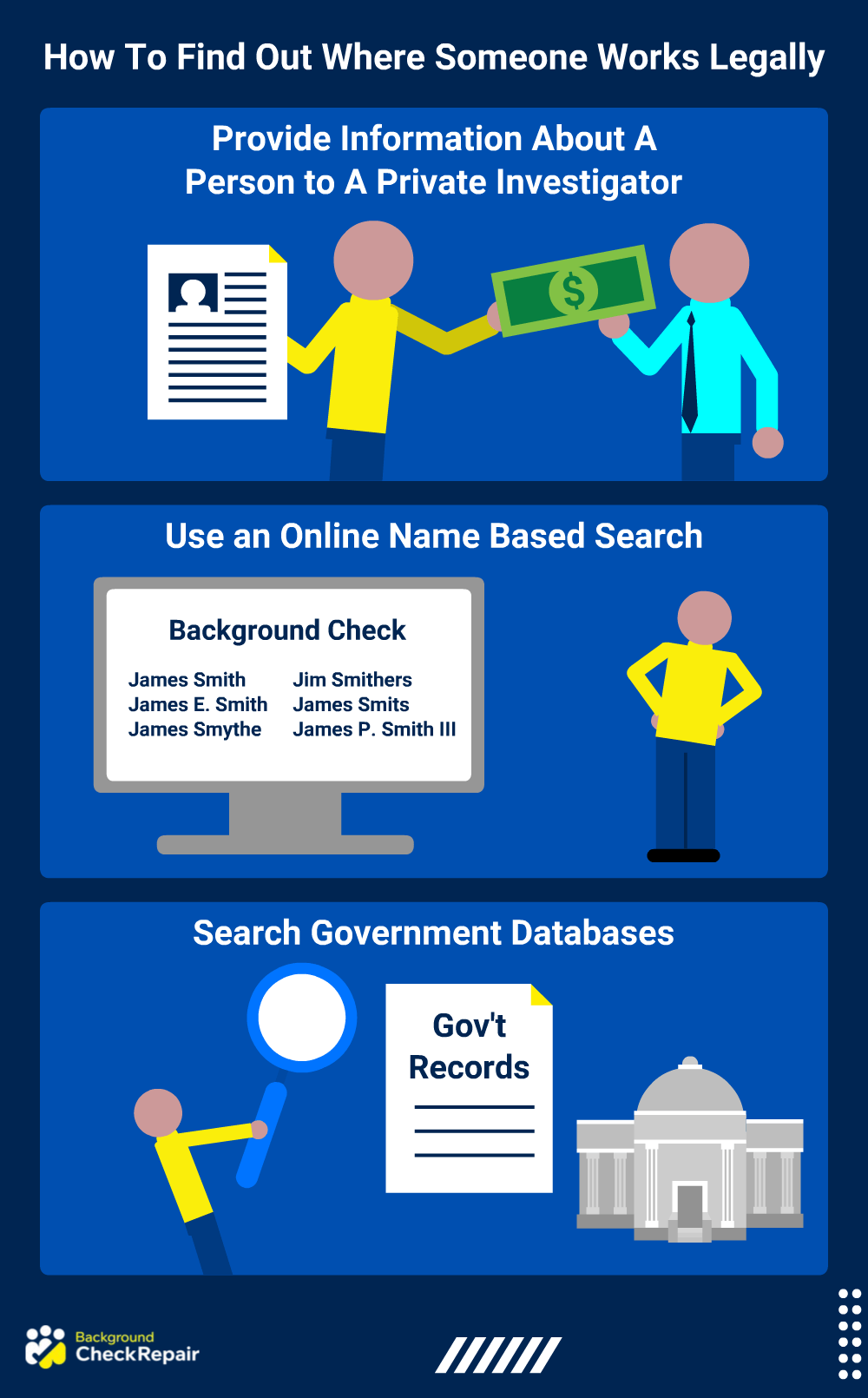
1. Provide Information About a Person to a Private Investigator
One of the easiest ways to learn more about someone’s place of employment is to hire a private investigator. A licensed investigator will have access to tools and industry knowledge that will allow them to easily (and legally) provide you with information about where someone currently works.
If you choose to hire a professional, you should know that they don’t have the ability to track anyone from private property. Any and all of their searches will be limited to public spaces. Furthermore, if the investigator tracks down information that proves a crime, they have the responsibility to release the information to local law enforcement.1 Finding a private investigator online can usually be done with an online search. Before hiring someone, you should make sure to do as much research as possible into their methods and reviews. Hiring an investigator who doesn’t follow the law can have a negative impact on you and the information found.
The largest downside to hiring a professional investigator is the cost. Most services aren’t cheap, which means that you could be spending a large amount to learn about employment information. The average cost to hire a private investigator in 2023 is about $50 per hour.5 This price can either increase or decrease depending on the state and experience of the person hired. While $50 an hour may not sound expensive, you will need to factor in the large amount of time it would take an investigator to complete the job. As mentioned earlier, one of the most important things to factor into your decision is the reason behind your search for knowledge. If it is for a legal matter, it may be worth it to spend the extra money to ensure quality information that is obtained legally. If you are searching for employment history based on a personal reason or curiosity, you may be better served choosing a less expensive, or even free, option.
2. Use an Online Name Based Search
In the process of learning how to find out where someone works, you will learn that there are many free, public sites that are available for online name-based searches (these will work better if you look up a person’s middle name first). One of the easiest methods involves using a search engine to type in the person’s name. In some cases, public information including employment information can be returned. Many websites contain databases with public information like a cell phone number or current address, much like an online phone book. If you aren’t able to locate employment information using your first search, you can always use the additional information found to conduct another one. While the accuracy of these online databases isn’t assured, it can be a great starting point. If you don’t have the person’s name, you may also consider learning no-cost techniques to determine an individual’s name through phone number.
Another common method involves searching social media sites like Facebook or LinkedIn. It is likely that employment information will be featured on a public profile. LinkedIn will likely be the most helpful regarding employment history, and it is fairly likely that it will list the name and state of employment (like a hostess on Johns Island, South Carolina). As with other name-based searches, it is important to understand that the information may not be current.
Anyone who values privacy, however, may be harder to track down. Privacy settings on social media and a lack of online sharing will hinder any results found.
If the above doesn’t work, the fool-proof method for an online name based search is using a level 1 records check.
3. Search Government Databases
If the person in question is employed by the government, you may be able to learn more about their position through a government database. The names, job titles, and salaries of government employees are often considered public records. Some states (Vermont, Virginia, Washington, South Dakota, and Tennessee) offer an online search tool that will return information about an employee based on a quick name search.2 Unfortunately, not all government jobs or state employee information will come back when using these search tools, like information on brand new employees. Additionally, this will only be a benefit if you know the state or branch of government in which the individual works.
Any knowledge gained from the searches should be used cautiously and legally. It is also important to know that the only way to get fully accurate employment information involves an approved background check or a legal warrant. Any questions about obtaining legal documentation such as a warrant should be directed to an attorney.
Is It Legal To Search for Someone’s Employment Information?
Depending on the method and reason behind the search, it can be perfectly legal to search for information about where someone works or has worked. If you are searching for a personal reason, such as investigating a parent who hasn’t paid child support, you can utilize the methods listed below without worry.
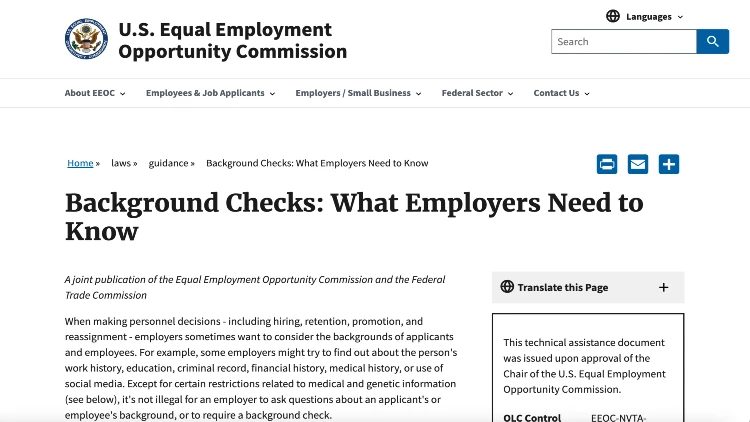
(Image: U.S. Equal Employment Opportunity Commission6)
Searching for employment information on someone for personal reasons is legal in most states (including North Carolina, North Dakota, etc). If the search is based on a professional need, such as for a pre-employment background investigation, you will need to make sure that you have the individual’s consent prior to any search.
There are many laws in place, set by the US Equal Employment Opportunity Commission, that limit how and why information can be obtained on someone during an employment search. This is meant to protect the employee from information that could hurt their chances of employment, especially if it was obtained without their knowledge.
Why Would You Want To Know Where Someone Works?
Reasons for wanting to know about someone’s employment status can vary, and likely depend on a personal situation including:4
- Confirming information received from a new boyfriend
- Trying to find someone to collect an unpaid debt
- Meeting a new friend or roommate
- Needing to locate someone due to a lawsuit or child support
- Curiosity about a friend or distant family member
Most reasons for wanting to find employment information are valid, other than those involving the desire to commit a crime of some sort.
Legal Tip: Information Obtained Can’t Be Used to Spy or Stalk an Individual
While learning how to find out where someone works, the information obtained can’t be used to commit a crime. If you find someone’s information about where they are working and use it to spy or stalk them, you could face criminal charges. Criminal charges for stalking or harassment vary depending on the state in which they occur (like South Carolina, South Dakota, or another state).
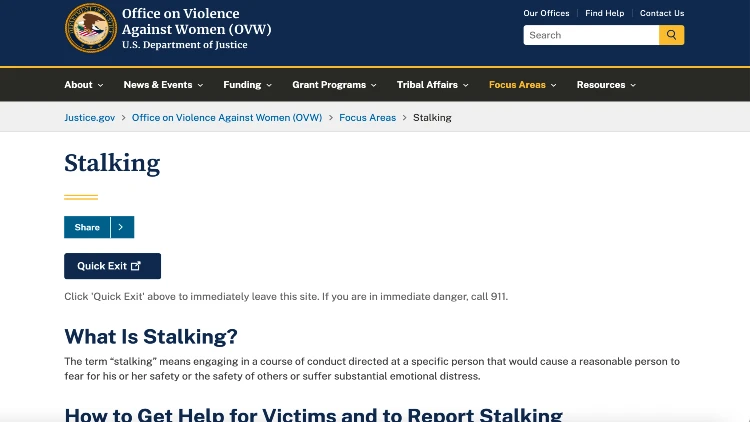
(Image: U.S. Department of Justice7)
Information you identify through a search can’t be used to harass another individual, blackmail them, or otherwise make them uncomfortable during a visit to their work. It should only be used to satisfy personal curiosity or aid in tracking people down to see if you can settle a debt or answer a lawsuit. If you have questions about the legality of your specific purpose for a search, you should get in touch with an attorney.
Can You Find Information About a Person and Their Employer Using a Social Security Number?
Finding yourself with someone’s social security number may lead you to think that you can track down their employment information this way. Unfortunately, this is not always the case. In most cases, a social security number won’t return any information when used directly in an online search. You may actually cause more trouble for the person in question by sharing their social security number with potential hackers on the web.
In order to accurately search for information about someone with a social security number, the search needs to be done through the United States Social Security Administration site. This search tool isn’t available to the public, and can only be accessed by registered employers or approved third-party tools. You may be able to use the social security number to search if you hire a third-party service to complete the employment check for you. This will come with its own set of fees and, potentially, legal requirements.3
Verifying Where Someone Works for Employment Purposes
If you are attempting to learn how to find out where someone works for employment purposes, you will need to first ensure that you have their permission for the search. Most state laws require employers to inform potential employees that a search will be conducted before moving forward. If the person declines to have their information searched, you won’t be able to look for it. An alternative method to having to find out where a certain someone works involves asking the person to obtain an employment verification letter to present to you. Verification letters, when valid, can provide the same information as an employment search without the cost or trouble of hiring a service.
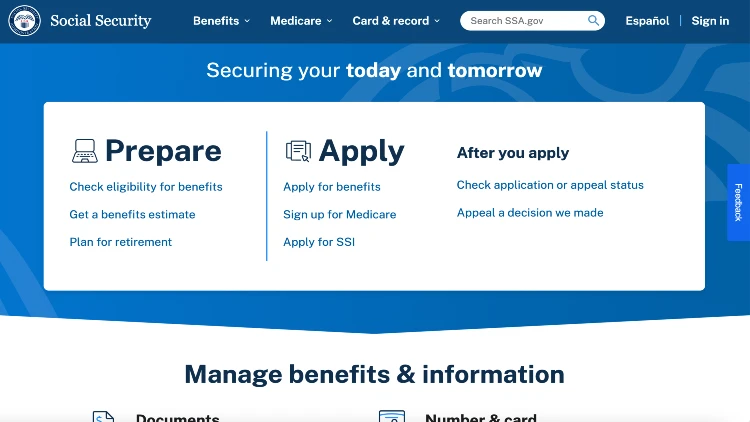
(Image: Social Security Administration8)
If you are able to get the person’s permission to search, the best way to check where they work involves running a pre-employment background check. Before getting started, you should know the requirements for a records check. Background checks can typically be run through professional services for a fee. When using a professional background check service, there is a higher chance that the information received will have been retrieved legally and can be confirmed to be accurate, which makes them a better fit than searching on your own. It is important to understand what may appear on a background investigation report. Accuracy is key when running a check for any type of employment. Rules and regulations regarding what type of information an employer can get on a background check can vary based on the state (North Dakota Ohio New York North Carolina) or even the county the job is located in. To get accurate information about rules in your state, you should check the state’s government website or the U.S. Equal Employment Opportunity Commission website.
Searching for information about where someone works is perfectly legal, as long as you are doing it for the right reasons. Any information obtained for personal reasons typically will not be frowned upon by the law, and should also help you feel more informed about someone. You should know that there is a chance that you won’t find the information you’re looking for while searching.
Free searches or searches that aren’t initiated by law enforcement can’t necessarily guarantee any information, or accurate information for that matter. There is also a chance that you will find information on someone that will be completely different than what you were expecting. Many people lie about their identity or history. If you do learn something surprising about someone, make sure that you don’t share the information maliciously or with the intent to harass them. During your search, you should use the tips on how to find out where someone works with caution.
References
1FingerLakes1. 12 Oct 2021. Legal Ways to Find Out Where Someone Works. 29 Nov 2021. Web. <https://www.fingerlakes1.com/2021/05/18/legal-ways-to-find-out-where-someone-works/>
2Open Gov US. n.d. Open Government Data in United States. 29 Nov 2021. Web. <https://opengovus.com/>
3Brownswood, Damica. N.d. How to Trace a Social Security Number to an Employer. LegalBeagle 29 Nov 2021. Web. <https://legalbeagle.com/5924970-trace-social-security-number-employer.html>
4Burgess, Nicole. 7 April 2021. How to Find Out Where Somebody Works. Kiwi Searches. 29 Nov 2021. Web. <https://kiwisearches.com/blog/how-to-find-out-where-someone-works/>
5Kissiah, Michael. 3 March 2021. Cost to Hire a Private Investigator. eInvestigator. 29 Nov 2021. Web. <https://www.einvestigator.com/private-investigator-cost/>
6U.S. Equal Employment Opportunity Commission. (2014, Mar 11). Background Checks: What Employers Need to Know. U.S. Equal Employment Opportunity Commission. Retrieved June 7, 2024, from <https://www.eeoc.gov/laws/guidance/background-checks-what-employers-need-know>
7U.S. Department of Justice. (2023, Nov 7). Stalking. Office on Violence Against Women. Retrieved June 7, 2024, from <https://www.justice.gov/ovw/stalking>
8Social Security Administration. (n.d.). Social Security Administration Homepage. Social Security Administration. Retrieved June 7, 2024, from <https://www.ssa.gov/>
